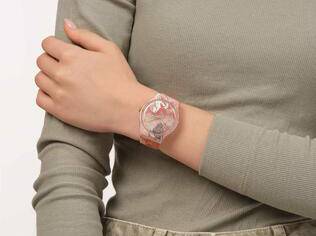The first and, to date, the only woman to win an Academy Award for Best Director, filmmaker and Rolex Testimonee Kathryn Bigelow began her career in the 1970s as a visual artist — a painter. She might never have gone into filmmaking, and the silver screen may have been deprived of one of its greatest talents, but for the encouragement of certain key mentors in those early days.

Rolex Testimonee Kathryn Bigelow and her Datejust 36
Her Oyster Perpetual Datejust 36 in Everose Rolesor features a slate,
diamond-set dial and a Jubilee bracelet. Find out more.
Just out of high school, while studying painting at the San Francisco Art Institute in the early '70s, Bigelow was accepted into the Whitney Museum of American Art's prestigious and highly selective Independent Study Program in New York. There, she met and was officially mentored during her studies in the program by the established artist and pioneer of conceptual art, Lawrence Weiner.
In an interview with Rolex, Bigelow described Weiner's mentorship as a "conversation". Weiner, Bigelow said, "would be very challenging, challenge your ideas. Why do you want to make this? Why is that an interesting idea? He would pose these wonderful existential questions … we would have these great, rigorous conversations that were in equal parts challenging, exciting, frustrating. That, for me anyway, is the genesis of inspiration."
Weiner's art incorporates a wide spectrum of media, including installations, explosions (yes, seriously), books, sound art, sculpture, performance art, graphic art, video and film. Bigelow actively participated in many of Weiner's film projects in the early 1970s, and also pitched in on film projects for performance artist Vito Acconci.
It was while working on a series of projections for Acconci (whose apartment Bigelow shared, along with fellow future artist-turned-director, Julian Schnabel) that she was first inspired to make a film herself. "Somehow I commandeered a camera, got a crew of friends together, and shot something," Bigelow told Interview magazine.
That magazine's creator, Andy Warhol, was instrumental in Bigelow's switch from art to film. The pop artist and filmmaking iconoclast suggested during a conversation with Bigelow that making movies would allow her to reach a broader audience. "Andy was saying that there's something way more populist about film than art — that art's very elitist, so you're excluding a large audience," Bigelow said.

In an interview with Time magazine, she explained, "I remember going to the [Museum of Modern Art] and looking at the Maleviches and the Mondrians, and thinking, 'The audience for this is very specific.' It requires that you come to it with a certain amount of information, a context. And you don't necessarily need that with film. A movie is accessible, available. That was exciting to me from a political standpoint."
Bigelow won a scholarship to study for a masters in film at Columbia University, where the division was co-chaired by the Academy Award-winning filmmaker Milos Forman, director of One Flew Over the Cuckoo's Nest and Amadeus. Here, Bigelow was taught by the legendary film theorist Peter Wollen. "He was great… He's illuminating," she told Interview. "Until I met him I was just looking at light reflected on a screen. After that it was more like a window. I graduated and wrote The Loveless."
Released in 1981, this tale of outlaw bikers set in the 1950s was Bigelow's first feature film, providing Willem Dafoe with his debut starring role. It led to the opportunity for Bigelow to make vampire film Near Dark in 1987. When that blood-spattered cult hit caught Oliver Stone's eye, Bigelow said, Stone called her and offered to produce her next film — female cop action thriller Blue Steel, starring Jamie Lee Curtis. "Without his involvement, it would never have been made," Bigelow said of Stone's support.
Kathryn Bigelow subsequently started what would become a lasting creative partnership with James Cameron, a fellow Rolex Testimonee. The latter first produced Bigelow's seminal 1991 surf-heist flick Point Break, with Keanu Reeves and Patrick Swayze, then produced and co-wrote her 1995 sci-fi / noir epic, Strange Days.
K19: The Widowmaker would be her next project in 2002. But it was The Hurt Locker released in 2008 that would catapult Bigelow to new heights. She won the Academy Awards for Best Picture and Best Director, and followed that up with Zero Dark Thirty in 2012 which was nominated for Best Pictures at the Oscars. Bigelow had truly scaled the pinnacle of Hollywood success.
Today, not least through her experiences with the many who came before her, Bigelow is helping inspire and uplift the next generation of cinematic talent. "I don't think you know at the time that it's happening, that you're passing on knowledge to somebody else," she said. "This is the authenticity of it."

Bigelow believes mentorship of the sort she benefitted from and is now giving back "is really a process of transferring information, transferring knowledge, a way of thinking, and it's unconscious. You don't think, 'Oh, I'm being mentored' or my work is potentially providing a crucible for somebody else to learn from. It's an invisible, intuitive process you can't control."
Discover more on Rolex.org


















